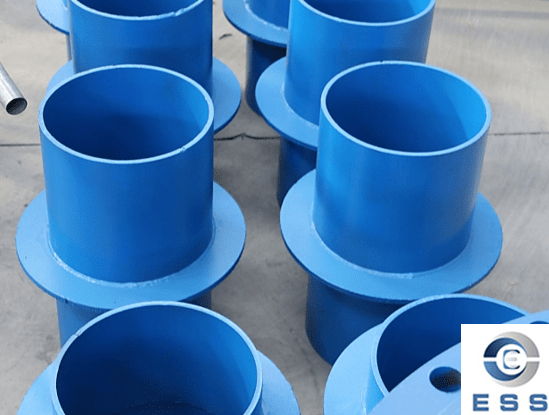
In engineering construction and pipeline
transportation, steel
casing pipe serves as a crucial component for protecting pipelines and
cables or providing structural support. Its thickness requirements are directly
related to safety, durability, and cost-effectiveness. Depending on the
application, media characteristics, and natural conditions, steel casing pipe
thickness must comply with different standards and specifications. The
following is an analysis of general standards, application areas, and key
influencing factors.
General Standards and Basic Thickness
Requirements
Chemical transportation casing has higher
requirements. For example, the thickness of steel casing pipe for DN100
pipelines is typically 5-7mm, but can increase to 8-10mm in high-pressure
environments.
According to US material standards, the
thickness of DN50 (standard grade) steel casing pipe is 3.9mm, while Sch 80
(extended grade) reaches 5.5mm, suitable for high-temperature and high-pressure
conditions.
3. Chinese Standard (GB/T 3091-2015)
For welded
pipes for general fluid transportation (such as Q235 material), the
thickness of steel casing pipe for nominal diameters (DN) 15-150mm is generally
1.8-4.5mm; for pipes DN200 and above, the thickness can be 6.0mm or greater.
For applications in corrosive environments or high pressure, a corrosion
allowance (typically 0.5-2mm) is required.
Steel Casing Pipe Thickness for
Different Applications
1. Municipal Engineering (Cable/Optical
Cable Protection)
Buried cable casings generally use
DN80-DN200 welded pipes with a thickness of 1.5-3.0mm to meet mechanical
protection requirements. For applications crossing roads or lightly loaded
areas, the thickness should be increased to 4-6mm to withstand pressure.
2. Petrochemical Industry
Oil pipeline casings should take into
account media corrosion and external loads. For example, DN300 20# steel casing
pipe in acidic environments must be ≥8mm thick and
feature an epoxy coal tar coating.
3. Building Water Supply and Drainage
The thickness of fireproof steel casing
pipe (e.g., DN150) must be at least 3.550mm, and general drainage casing can be
reduced to 2.75mm.
4. Special Environments
Due to water pressure and impact, submarine
pipeline casings can be up to 12-20mm thick and utilize a double-sided welding
process.
Factors Affecting Thickness
1. Mechanical Properties
Internal Pressure Calculation
Determine the required pressure using the
formula: t = P (2S) (P = pressure, D = diameter, and S = allowable stress).
External Loads
Finite element analysis is required to
analyze deformations such as soil pressure and vehicle dynamic loads.
2. Corrosion and Damage
In acidic soils or sandy media, the
thickness should be increased by 1-2 mm to allow for corrosion, or stainless
steel (such as 304/316L) should be used instead of carbon steel.
3. Economy and Lifespan
Excessive thickness increases costs, while
excessive thinness shortens service life. For example, in municipal
engineering, galvanized steel casing pipe has a design life of 30 years and
should be 0.5 mm thicker than bare steel pipe.
4. Installation Process
Due to the complex load conditions, the
steel casing pipe thickness for pipe jacking projects should be 10%-15% thicker
than for direct burial.
Criteria for Selecting Steel Casing Pipe
Thickness
1. National Standards and Regulations
The thickness of steel casing pipe must
first be determined in accordance with national standards. These standards
detail the recommended wall thickness for different sizes of steel casing pipe,
providing an important basis for engineering design. For example, the standard
wall thickness for DN50 rigid waterproof casing is 3.9 mm, while the wall
thickness for DN100 is 5-7 mm.
2. Operating Environment and Conditions
The operating environment and conditions of
steel casing pipe are also key factors in determining its thickness. In highly
corrosive environments, extremely high temperatures, or high pressures, thicker
steel casing pipe is required to ensure resistance to corrosion, wear, and
thermal deformation.
3. Material Selection
In addition to environmental and pressure
factors, the material of steel casing pipe also influences its thickness
selection. High-quality steel offers better corrosion resistance and surface
smoothness, making it suitable for protecting pipelines in high-pressure and
harsh environments. Therefore, when selecting materials, the compatibility of
material and thickness should be comprehensively considered.
Summary
The thickness requirement for steel casing
pipe is a complex and important issue. In practical applications, it is
necessary to comprehensively consider the specific operating conditions and
safety standards to ensure that the casing can operate safely and stably in
various environments.
Read more: A Comprehensive Guide To Steel Casing Pipe or Wall Thickness Requirements of Steel Casing Pipe













 Eastern Steel Manufacturing Co.,Ltd not only improve product production and sales services, but also provide additional value-added services. As long as you need, we can complete your specific needs together.
Eastern Steel Manufacturing Co.,Ltd not only improve product production and sales services, but also provide additional value-added services. As long as you need, we can complete your specific needs together.










